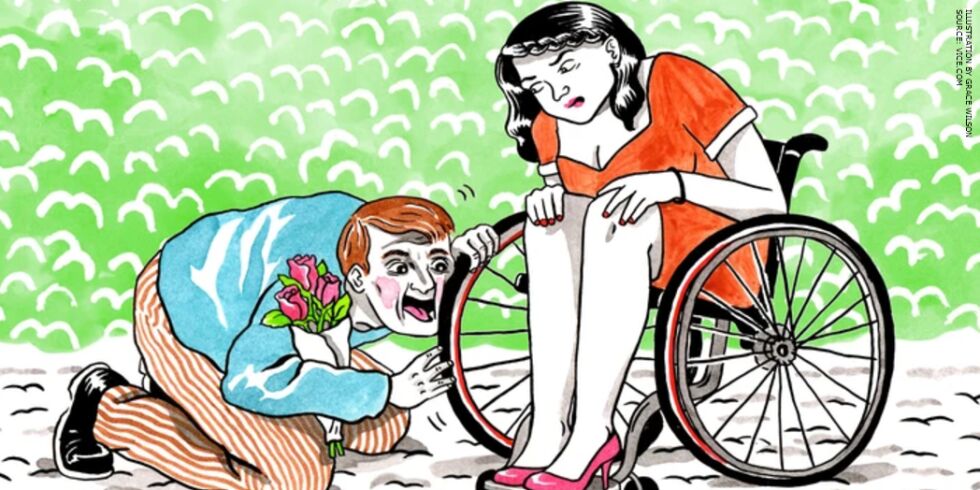In love with the disabled or the disability?
- 4 minutes to read
- 28 January 2020
- kitwan
In love with the disabled or the disability?
“I really like you. You’re such an inspiration.”
“I find you very sexy using the wheelchair.”
Many would argue these are things you should not say to wheelchair users and people with disabilities. However, some find such admiration acceptable or even empowering. The truth is it can be real love but it can also be devotee.
People with special sexual interest
Devotee, as defined in Cambridge Dictionary, is “a person who strongly admires a particular person or is extremely interested in a subject”. Devotees of a pop star, a sport, or a lifestyle – they are everywhere and are often considered normal.
However, there are quite a number of devotees who are considered sinful because they show sexual interest in unconventional objects or characteristics such as impairments and wheelchairs.

People with attraction to disability may have a different opinion on what’s sexy about this photo. (Source: https://www.mid-day.com/articles/us-amputee-snowboarder-brenna-huckaby-wants-women-to-feel-powerful-and-sexy/19079181)
People tend to first learn about devotees through social media or online dating platforms. In one of our previous blog posts, we have mentioned that people frequently struggle with whether or when to reveal their disability to their online love interest. Venessa Parekh, a wheelchair user, didn’t have that struggle. She chose to mention in her online dating profile that she uses a wheelchair, thinking it can serve as a first line of defense. She explained, “It would weed out any creeps and save me from the visual onslaught of strangers’ private parts.” However, her decision was only partly right. Because months later, someone messaged her,
“Have you always used a wheelchair? I find them very sexy.”
Here’s another absurd experience: Laura Beck, who became paralyzed in 2016, found one of her personal videos on a porn site. What puzzled and disturbed her is that the video had nothing to do with sex but only showing her being transferred from a car to a wheelchair.
Getting to know devoteeism
If you’ve read our earlier post about faith healing, you’d probably remember Emily Yates. She’s a journalist and television presenter born with cerebral palsy, and has been using a wheelchair since the age of nine. Her first encounter with devotees also happened online.
One day Emily uploaded to her Facebook a photo of her in wheelchair, in which she’s dressed up nicely ahead of the university’s annual ball. Someone left an unexpected comment under the photo: “pretty cripple”. At the beginning, it left Emily shocked and offended. Later on, with leads from her friends as well as her own research, she discovered the online world for devotees.
Together with the BBC Three production team, Emily met up with a few people, including devotees and a sex worker in wheelchair, to learn about their thoughts and experiences on devoteeism.
Firsthand experiences with devotees
The two devotees Emily met in person share something in common: they both realized their desire for people with disabilities from an early age. When other people feel sorry or lose interest in people with disabilities, they find them particularly attractive and beautiful. They see mobility aids like wheelchairs and crutches as beauty items, and would even use one themselves despite they are able-bodied.
One of the devotees told Emily that her desire for disabilities is so strong that she can only be sexually aroused by people with noticeable disabilities. In extreme scenarios, when her partner’s disability is not apparent in bed, she had to look at the mobility aids to become sexually aroused.
Indeed, such an intense attraction to disability does not seem to be rare. Leah Caprice, nicknamed “ParaPrincess”, shared with Emily how some people are interested in her because of her disability instead of her sex appeal.
Leah has continued to work in the sex industry after becoming a wheelchair user since late 2008. She mainly produces porn videos of her own. At some point, she realized that quite a number of people are equally or even more sexually aroused by her ordinary videos like washing a car or putting on tights. She said, “It’s not sex that they (devotees) want to see. They want to see disability.”
Refraining from the downside of devoteeism
After numerous discussions both online and offline, Emily finds that devoteeism is not entirely negative. Undoubtedly, she’s still upset about those who enjoy seeing and are sexually aroused by the daily struggle of people with disabilities. However, she also understands that for some people, devoteeism is rather inborn. Devotees probably see people with disabilities as equals more than anyone in general, and yet a majority of them are socially stigmatized. Emily hopes that the open discussion of devoteeism would help people of all abilities to rethink about their sexual interests and decisions.
Likewise, Kath Duncan, an amputee and disability rights activist, opened up her experience with devotees. She claimed that her relationship with devotees has changed her attitude about herself:
“I started to see myself and my body differently, and I discovered the amazing potentials in my sensual expression to use my stumps, where previously I had felt uncomfortable about their place in my sexual experiences.”

Empowered by some devotees, Kath Duncan sees herself differently and feels more comfortable about her disabilities. (Source: http://www.luxville.me/works/mistress-iris/)
In any case, people should be extra alert to their limits while dealing with devoteeism. Experts warn people about the high potential of devoteeism turning abusive quickly, which can hinder the development of a mutual caring relationship. Therefore, any dehumanizing behaviors such as discouraging one’s independence and non-consensual objectification should always be rejected or inhibited.
What are your experiences with devoteeism? How would you deal with attraction to disability?

